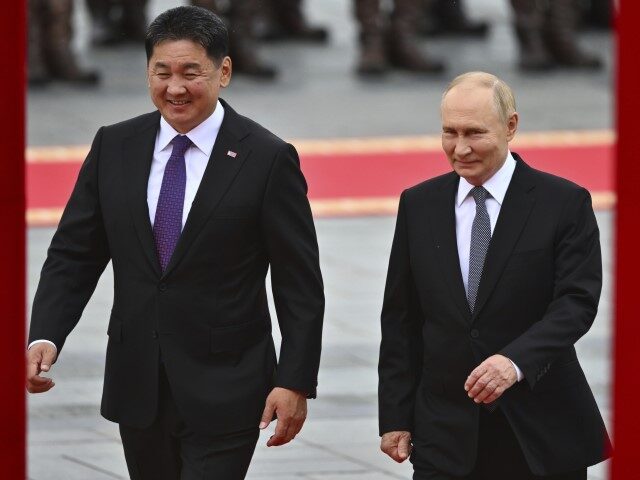Russian President Vladimir Putin enjoyed a red-carpet welcome in Mongolia on Monday despite Ukraine’s pleas for the Mongolian government to honor an international warrant and arrest the Russian despot as a war criminal.
No expense was spared for the Russian leader’s visit. Putin was ferried to a meeting with Mongolian leader Ukhnaagiin Khurelsukh in a luxury limousine and greeted with a kiss and bouquet of flowers by a young girl before strolling through ranks of ceremonial cavalry soldiers.
“Relations with Mongolia are among the priorities of our foreign policy in Asia. They have been brought to a high level of comprehensive strategic partnership,” Putin told Khurelsukh, who responded by hoping for increased trade with Russia.
Putin’s trip to Mongolia marked his first visit to a member of the International Criminal Court (ICC) since the court issued a warrant for his arrest on March 17, 2023.
Putin and one of his high officials, Commissioner for Children’s Rights Maria Alekseyevna Lvova-Belova, are wanted as war criminals for allegedly kidnapping thousands of children from Ukraine after Putin launched his illegal invasion of that country in February 2022.
The ICC was established by an international treaty called the Rome Statute, which currently has 124 signatories. Mongolia signed the treaty in December 2000, which means it is technically obliged to honor the ICC warrant and place Putin under arrest.
On Monday, Mongolia became the first ICC treaty member to officially disregard the warrant. A few other countries have chafed under the pressure of their legal obligation to take Putin into custody if he visited, notably including South Africa, which signed the Rome Treaty in 1998.
South Africa had the geopolitical equivalent of a nervous breakdown when Putin made plans to visit for a summit of the BRICS economic bloc in August 2023. South African President Cyril Ramaphosa flailed about for months, looking for some legal technicality that might relieve him of the responsibility of arresting Putin. After Ramaphosa finally admitted he was terrified of fulfilling his obligations under the ICC treaty because it would be a “declaration of war” against Russia, Putin let him off the hook by choosing not to attend the BRICS summit in person.
A year later, the Russian autocrat apparently felt no such face-saving concessions were necessary with Mongolia. Last week, after the ICC stated that it expected Mongolia to fulfill its treaty obligations and place Putin under arrest, the Kremlin breezily dismissed the possibility.
“There are no worries, we have a great dialogue with our friends from Mongolia. All aspects of the visit were carefully prepared,” Kremlin spokesman Dmitry Peskov said on Friday.
The Ukrainian government forcefully reminded Mongolia of its ICC treaty obligations.
“The Ukrainian side hopes that the government of Mongolia is aware of the fact that Vladimir Putin is a war criminal. We call on the Mongolian authorities to execute the binding international arrest warrant and transfer Putin to the International Criminal Court in The Hague,” the Ukrainian Foreign Ministry said in response to Peskov’s statement.
When Putin arrived in the Mongolian capital of Ulaanbaatar on Monday to find a lavish red carpet reception waiting for him instead of a prison cell, the Ukrainian foreign ministry declared that Mongolia has “allowed an accused criminal to escape justice, thereby sharing responsibility for the war crimes.”
“The Mongolian government’s failure to carry out the binding ICC arrest warrant for Putin is a heavy blow to the International Criminal Court and the international criminal justice system,” said Ukrainian Foreign Ministry spokesman Heorhii Tykhyi.
“We will work with partners to ensure that this has consequences for Ulaanbaatar,” Tykhyi warned.
Putin has visited a few countries that are not ICC members with impunity, including China, North Korea, and Vietnam. Mongolia was a good strategic choice for him to finally smash the ICC’s international credibility, as there was very little chance the Mongolians would jeopardize their enormous energy trade with Russia – and possibly their minerals trade with Moscow’s allies in Beijing – by arresting the Russian president.
“Mongolia imports 95% of its petroleum products and over 20% of electricity from our immediate neighborhood, which have previously suffered interruption for technical reasons. This supply is critical to ensure our existence and that of our people,” a spokesperson for the Mongolian government told Politico Europe on Tuesday.
“Mongolia has always maintained a policy of neutrality in all its diplomatic relations, as demonstrated in our statements of record to date,” the spokesperson said.
Russia has a particularly expensive and strategically important deal on the table with Mongolia at the moment: the Power of Siberia 2 pipeline, a 1600-mile line that would make it easier for Russia to pump natural gas to China. If the pipeline is completed, it could largely erase the losses Russia suffered when Europe cut its natural gas purchases in the wake of the Ukraine invasion.
The Power of Siberia 2 has recently looked stalled, or even dead, to some outside observers, but Putin said before leaving for Mongolia that preparations are still underway to construct the pipeline and the overall project is largely on schedule. After meeting with Khurelsukh, Putin praised the potential of natural gas cooperation with Mongolia, and suggested Russia may begin selling gas to Mongolian customers.
Mongolia’s decision to roll out the red carpet for Putin was another embarrassment for the Biden-Harris administration, which has been touting improved relations with Ulaanbaatar. Secretary of State Antony Blinken visited Mongolia at the beginning of August, rhapsodizing about the “common vision that we share for what the future should look like.”

COMMENTS
Please let us know if you're having issues with commenting.